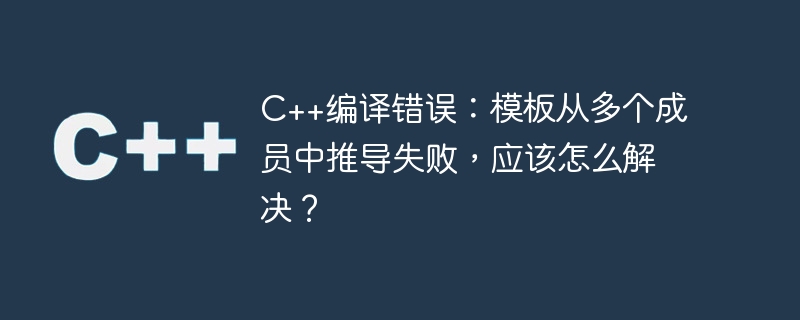

When using templates in C, sometimes we encounter compilation errors. The error message is "Template derivation failed from multiple members." This error is common. One of the template errors. So how should we solve this problem?
First, we need to understand some basic knowledge of templates. Templates are an important concept in C. Common codes can be written as templates, which can make the code more flexible and applicable to different data types. The syntax of templates in C is very flexible. We can define function templates, class templates, member function templates, etc.
When we use a template, the compiler will perform type deduction based on the parameter type of the call to get a specific template instance. But sometimes the compiler cannot deduce the specific type, and an error "Failed to derive from multiple members" will appear. Let's look at some examples to understand this error scenario.
Example 1:
template<typename T>
void Print(T value) {
cout << value << endl;
}
int main() {
Print("hello");
return 0;
}In this example, we define a general printing function Print that can print any type of value. In the main function, we call the Print function and pass a string parameter. But the compiler cannot deduce the specific type and reports an error.
Example 2:
template<typename T>
T Max(T a, T b) {
return a > b ? a : b;
}
int main() {
cout << Max(3, 5.7) << endl;
return 0;
}In this example, we define a general maximum function Max, which can find the maximum value of any type of value. In the main function, we call the Max function and pass an integer and a float parameter. But the compiler cannot deduce the specific type and reports an error.
In the above two examples, the compiler cannot deduce the specific type because these types are different, so the error "Failed to derive from multiple members" will occur.
So how should we solve this problem? We can take the following approach:
We can explicitly specify the template parameter type when calling a template function or class, so that the compiler can Deduces a concrete template instance from the specified type. For example:
Print<string>("hello"); // 明确指定T为string类型
cout << Max<int>(3, 5.7) << endl; // 明确指定T为int类型We can write the implementation of the template function or class into multiple versions, each version targets different data types and performs them separately. Type inference. This is overloading. For example:
template<typename T>
void Print(T value) {
cout << value << endl;
}
void Print(const char* value) {
cout << string(value) << endl;
}
int main() {
Print("hello"); // 调用重载版本的Print
return 0;
}We can provide specialized versions of template functions or classes for specific types, so that the compiler can use these specializations. ized version for type deduction. For example:
template<typename T>
void Print(T value) {
cout << value << endl;
}
template<>
void Print(const char* value) { // 为const char*类型提供特化版本
cout << string(value) << endl;
}
int main() {
Print("hello"); // 调用特化版本的Print
return 0;
}Summary:
When using templates in C, the error "template derivation failed from multiple members" is a common problem. We can take some steps to solve this problem, such as specifying template parameter types explicitly, using overloading, and using template function specializations. Mastering these skills will allow us to use C templates more skillfully and write more flexible code.
The above is the detailed content of C++ compilation error: Template derivation failed from multiple members, how to solve it?. For more information, please follow other related articles on the PHP Chinese website!
 What are the differences between c++ and c language
What are the differences between c++ and c language
 Recommended learning order for c++ and python
Recommended learning order for c++ and python
 Cost-effectiveness analysis of learning python and c++
Cost-effectiveness analysis of learning python and c++
 Is c language the same as c++?
Is c language the same as c++?
 Which is better to learn first, c language or c++?
Which is better to learn first, c language or c++?
 The difference and connection between c language and c++
The difference and connection between c language and c++
 C++ software Chinese change tutorial
C++ software Chinese change tutorial
 Cost-effectiveness analysis of learning python, java and c++
Cost-effectiveness analysis of learning python, java and c++




